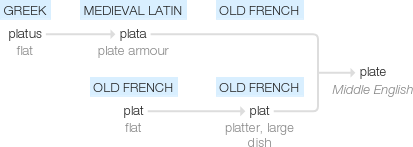Plate
Middle English (denoting a flat, thin sheet, usually of metal): from Old French, from medieval Latin plata ‘plate armour’, based on Greek platus ‘flat’. plate (sense 1 of the noun) represents Old French plat ‘platter, large dish’, also ‘dish of meat’, noun use of Old French plat ‘flat’.
wiktionary
Middle English, from Old French plate, from Medieval Latin plata, from Vulgar Latin *plat(t)us, from Ancient Greek πλατύς(platús, “broad, flat, wide”). Compare Spanish plato.
Middle English, partly from Anglo-Norman plate(“plate, bullion”) and partly from Latin plata(“silver”), from Vulgar Latin *platta(“metal plate”), from feminine of Latin *plattus(“flat”).
etymonline
plate (n.)
mid-13c., "flat sheet of gold or silver," also "flat, round coin," from Old French plate "thin piece of metal" (late 12c.), from Medieval Latin plata "plate, piece of metal," perhaps via Vulgar Latin *plattus, formed on model of Greek platys "flat, broad" (from PIE root *plat- "to spread"). The cognate in Spanish (plata) and Portuguese (prata) has become the usual word for "silver," superseding argento via a shortening of *plata d'argento "plate of silver, coin."
From 14c. as "armor made of sheets of metal." Meaning "table utensils" (originally of silver or gold only) is from Middle English. Meaning "shallow dish on which food is served at table," now usually of china or earthenware, originally of metal or wood, is from mid-15c. Meaning "articles which have been covered with a plating of precious metal" is from 1540s.
In photography, "common rectangular piece of glass used to receive the picture," by 1840. The baseball sense "home base" is from 1857. Geological sense "nearly rigid part of the earth's lithosphere" is attested from 1904; plate tectonics is attested from 1967. Plate-glass for a superior kind of thick glass used for mirrors, shop-windows, etc., is recorded from 1729.
plate (v.)
"to cover (something) with a layer of metal or mail," late 14c., platen, from plate (n.). Related: Plated.
